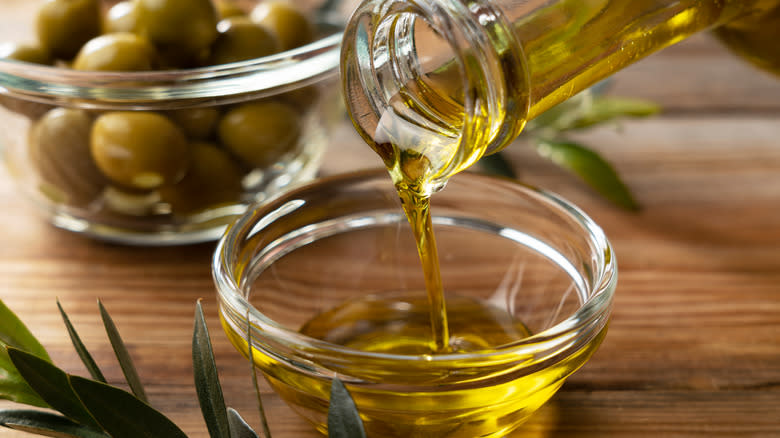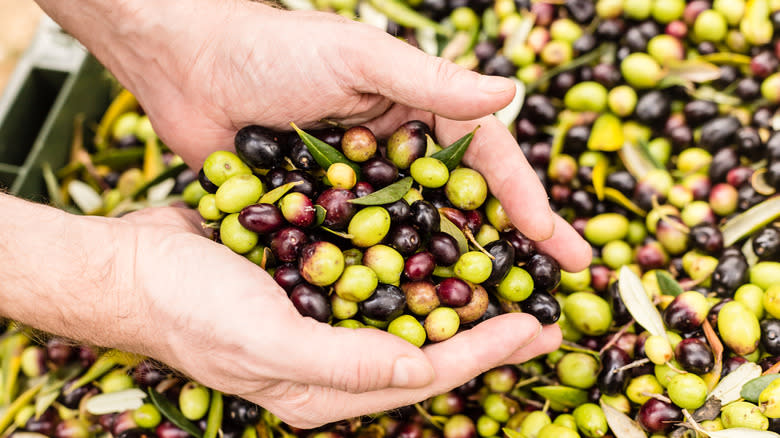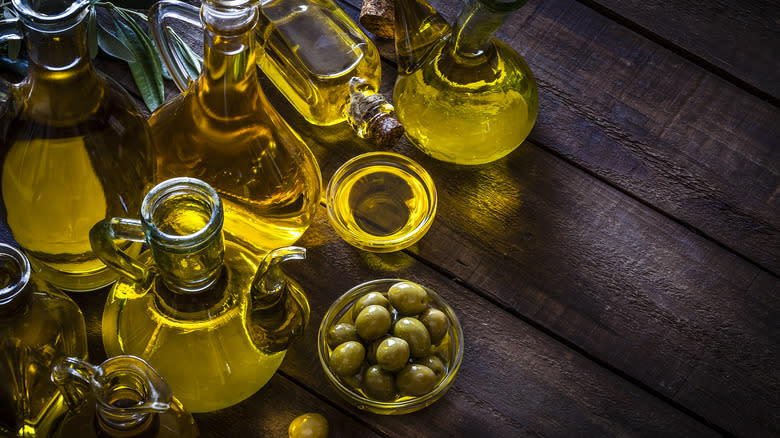Why You Should Consider Hosting An Olive Oil Tasting Party

A cooking oil, flavor enhancer, and health supplement to some, olive oil is a massively important ingredient in many cultures around the world. As such, there's a wide variety of olive oils to choose from when stocking your kitchen, to the point that it can be a little overwhelming to find your go-to bottle. To solve this problem, we recommend a decision-making strategy that is just as fun as it is effective: hosting an olive oil tasting party.
An olive oil tasting, similar to a wine tasting, is a social gathering where you and your guests sample a range of oils to learn about their distinct tastes. Doing so solves several pain points that come with trying to parse your olive oil options. For one, it cuts down on costs. Purchasing many olive oil bottles on your own would be quite expensive, whereas the shared price split between guests is much more reasonable. Secondly, it's far less wasteful. While olive oil lasts for quite a while — between one to two years — it does eventually expire. Having more tasters present ensures you use up any excess olive oil, and you can send home bottles that you didn't like with guests who did enjoy them. Of course, there is also the fun factor; that is to say, why host a tasting for yourself when you can do so with friends?
Read more: 12 Types Of Barbecue Sauce And When To Use Them
How To Curate An Olive Oil Selection

The most important part of hosting this event is the selection of olive oils you will sample. First, you'll want to decide which types of olive oil to taste by considering different processing methods and regions of origin. Since the oils will be the stars of the show, we recommend skipping over any that have been processed at a quality below extra virgin. This level of quality distinction requires very strict processing guidelines that ensure your tasting setup will have strong, complex, and pleasant flavors and textures.
The part of the world in which the olive oil is produced will also impact its flavor, since the soil composition and climate of each area changes the growth of the olives themselves. For example, Spanish olive oil tends to have a sharper, more peppery taste, while Italian olive oil leans herbaceous and grassy. You might even taste some with fruity notes. For a well-arranged spread, be sure to purchase oils from all over the map, including known olive oil hotspots such as Greece, Tunisia, and California. There are also blended olive oils that contain a mix of olives from multiple regions and possess their own unique flavor as a result.
Serving And Tasting Technique

Professional olive oil tasters don't use any food for tastings, but rather sip the oil as you would wine. If you want to try this approach, be sure to have enough small drinking glasses on hand to provide a clean one to each guest for each oil. If dipping is more your style, you can alternatively serve the oils in ramekins along with a crust of a neutral-tasting bread. Also important to include at your table are palate cleansers that will refresh your tongue between tastings — green apple and seltzer water are popular options. Finally, paper and pens can be a great touch, as they provide a way for guests to record their thoughts.
To properly taste olive oil, begin by simply observing the color and transparency of it. Next, swirl the oil in its glass and sniff to appreciate the aroma. Finally, take a sip. Let it sit on your tongue for a few moments as you absorb its flavor, then swallow to see how the flavor changes. At different stages of this journey you will pick up on different notes, such as butter, green tea, or even cinnamon. Make notes of which oils you enjoy most, then cleanse your palate and continue on. By the end, you're sure to find a few olive oils you want to keep in your kitchen for various occasions.
Read the original article on Tasting Table.


